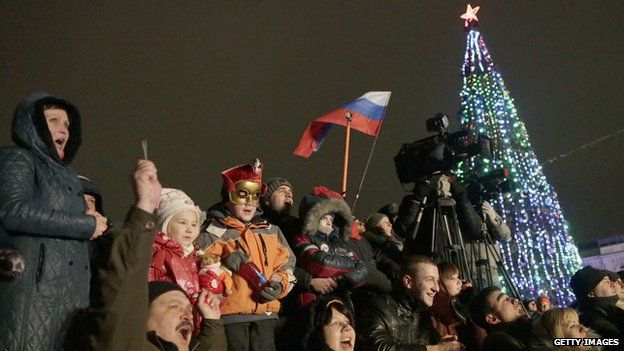Ukraine conflict: Crimea hit by shortages
- Published

Life is tougher now, but many residents of Crimea appear happy to have joined Russia
Ten months after annexation by Russia, Crimea is living through its most troubled holiday season yet.
Ties with Ukraine are at breaking point, and Western sanctions make life difficult, in what used to be a popular tourist destination.
There have been highly disruptive power blackouts, transport links with the outside world are strained, there is less choice in the shops, and the region's banking system has been crippled.
But many locals seem happy to be part of Russia. The Black Sea peninsula has a Russian-speaking majority.
Trouble begins even before you get to Crimea. Citing security concerns, Ukraine unexpectedly severed all rail and bus links with the region just as the holiday season was getting under way in late December. Trains now go only as far as Novooleksiyvka, a sleepy village close to the border with Crimea.
Drivers had to spend more than 20 hours waiting to cross into Crimea
Gridlock ensued as crowds of confused passengers descended on checkpoints set up by Ukraine and Russia nearby. Thousands flocked to cross the border on foot - a challenging endeavour which required a 4km (2.5-mile) hike in freezing cold.
The only alternative was to drive, and spend at least 20 hours in the queues. It was even worse for lorry drivers bringing in supplies from Ukraine: some had to wait for weeks to cross the border.
Food deliveries to Crimea have been a problem for months, with disruptions often leaving shelves bare in local supermarkets.
Following the March 2014 annexation by Russia, air and sea links to the peninsula have been badly affected - it is now served almost exclusively by Russian firms. The annexation was condemned internationally and triggered Western sanctions.
The main station in Crimea's capital Simferopol looks empty after Ukraine cut all rail links with the region
In the dark
Disruption continues when you make it into Crimea. Major power cuts turned the New Year holiday rush into a nightmare for locals.
"There were times when we had electricity for only a few hours a day, it was utter chaos," says Toma, a mother of two from Simferopol.
In addition to bringing candle-light into Crimean homes, blackouts also disrupted mobile phone services, heating and hot water supplies. In parts of Crimea, trolleybuses came to a standstill and traffic lights stopped working for hours.
During power cuts street lights went out, and train stations, businesses and the airport had to close
The outages resulted from an energy crisis in Ukraine, the source of some 80% of Crimea's electricity. Problems started after pro-Russian separatists took control of coal mines in Ukraine's east, interrupting supplies to power stations.
Things improved late last month, when Russia agreed to supply coal and electricity to Ukraine. There have been no power cuts since, but many residents are still holding on to their candles, amid warnings that cuts may resume any moment.
Cash only
Shoppers in Crimea have been hit by the Western sanctions on Russia.
There is enough food, but the choice is often limited. At Auchan, one of Simferopol's largest supermarkets, signs say credit and debit cards are no longer accepted "for technical reasons". The real reason is that Visa and MasterCard withdrew from Crimea, and major Russian banks are unwilling to do business there, fearing worse sanctions.
Severed transport links mean that there are empty shelves in some shops
All this makes local businesses consider moving operations elsewhere.
A project manager at a Simferopol-based US-owned IT company, who did not want to be named, says her work has been seriously disrupted by the blackouts and problems with money transfers. The last straw was Washington's ban on US companies doing business in Crimea.
"We now have until 1 February to find another region to work. We are looking at several European countries, from Greece to Bulgaria," she says.
On 20 December, the US banned the export of goods, technology and services to Crimea, while similar restrictions were imposed by the EU and Canada.
No regrets
Yet it is not all doom and gloom for residents of Crimea, many of whom say they feel more at home in Russia than they did in Ukraine.
Despite the economic difficulties, the Orthodox Christmas joy shows no sign of abating in Sevastopol, a staunchly pro-Russian city and base of Russia's Black Sea Fleet.
Merchandise on sale in Sevastopol hails Russian President Putin as a hero
There is a Christmas market in the city's main square, which would not look out of place in the West, were it not for the stage decked out in the colours of the Russian flag and a rock version of the Russian anthem blaring out of loudspeakers.
Vendors are selling T-shirts with portraits of President Vladimir Putin. "In Putin we trust" says one caption, while another calls him "the politest of people". It is a reference to the "polite men" - the local nickname for the Russian soldiers deployed to Crimea in the run-up to annexation.
A retired local university professor, who did not want to be named, said his pension had increased ten-fold compared to what he had received from the Ukrainian authorities. The frequent power cuts were "unpleasant", he admitted, but stressed that "we are part of Russia now, and things will only get better.
"Ukraine will have no power to do nasty stuff to us anymore," he added.
BBC Monitoring, external reports and analyses news from TV, radio, web and print media around the world. For more reports from BBC Monitoring, click here. You can follow BBC Monitoring on Twitter, external and Facebook, external.
- Published21 June 2023